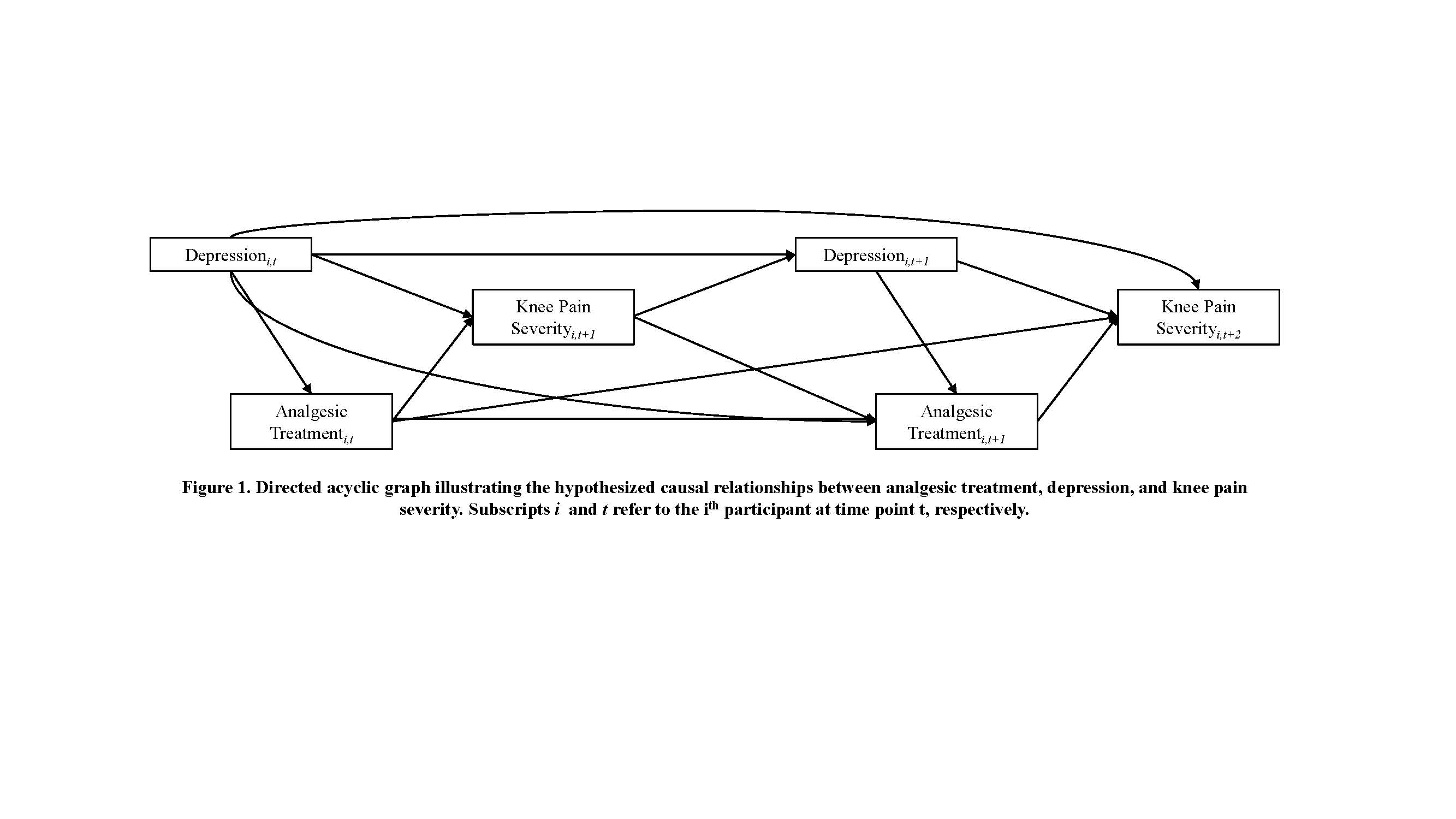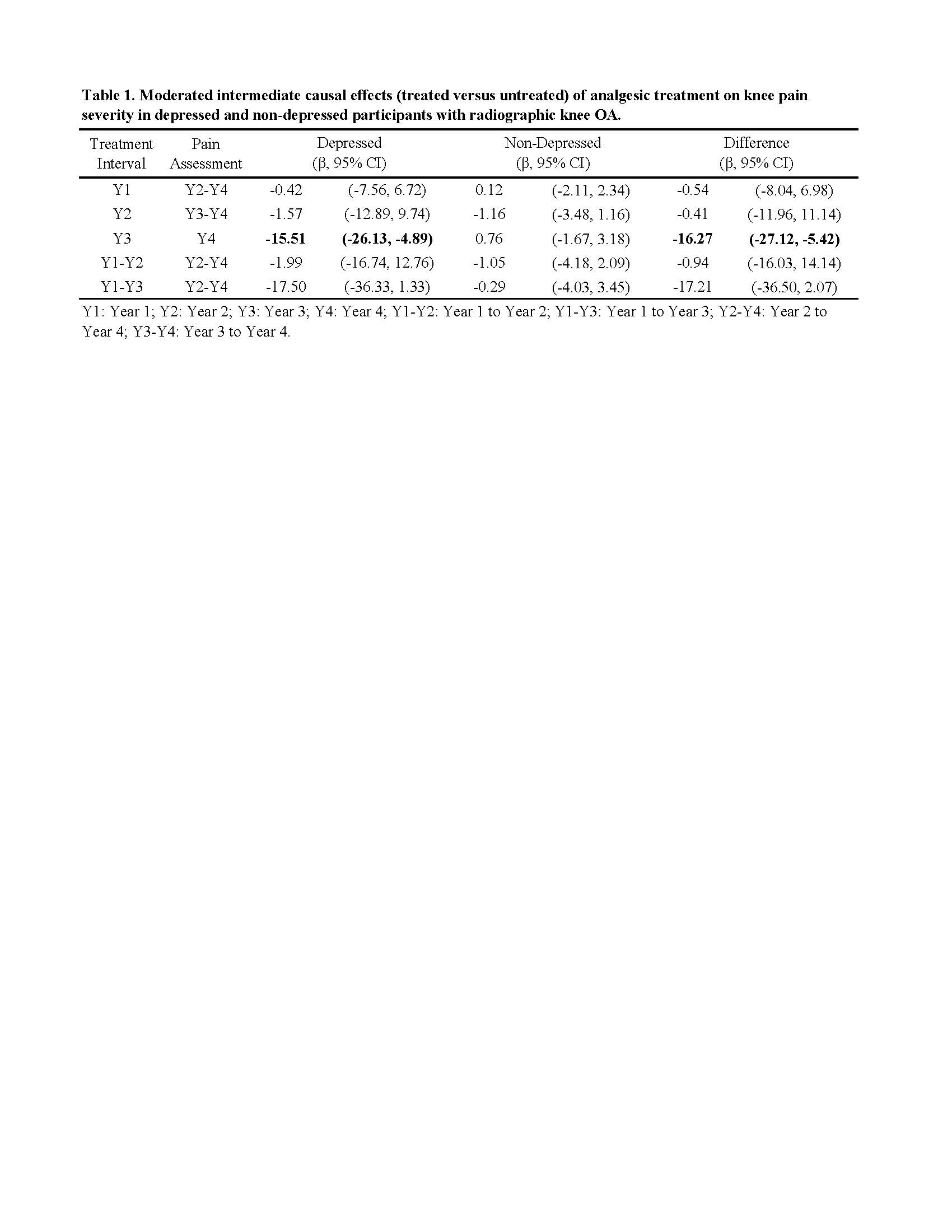Session Information
Session Type: ACR Abstract Session
Session Time: 4:30PM-6:00PM
Background/Purpose: Depression often accompanies knee osteoarthritis (OA), exacerbating the severity and persistence of pain, and may negatively affect clinical outcomes associated with analgesic treatment. This study evaluated whether depression moderates (Figure 1) the effectiveness of analgesics on knee pain severity in knee OA.
Methods: Eligible participants (n=1,477) were identified from the Osteoarthritis Initiative and were not using analgesics (acetaminophen, non-steroidal anti-inflammatory drugs, or opioids) at baseline (time t) and had radiographic disease (Kellgren-Lawrence [K-L] grade 2, 3, or 4) at the first annual follow-up visit (time t+1). Analgesic initiation and utilization was assessed at the first three annual follow-up visits (time t+1, time t+2, time t+3), and depression was evaluated concurrent to analgesic use with the Center for Epidemiological Studies Depression (CES-D) scale and corresponding screening threshold (CES-D score ≥ 16). Knee pain severity from the second to the fourth annual follow-up visit (time t+2, time t+3, time t+4) was measured with the Western Ontario and McMaster Universities Osteoarthritis Index (WOMAC) pain scale (rescaled range = 0-100). Time-invariant and time-varying confounders measured at time t and time t+1, time t+2, and time t+3 were age, sex, race, education, marital status, employment, health insurance, smoking, alcohol consumption, Charlson comorbidity index, and symptomatic knee OA status; and K-L grade, body mass index, physical performance, knee injuries, knee injections, and WOMAC pain score, respectively. Structural nested mean models appropriate for evaluating time-varying effect moderation were implemented using an inverse-probability-of-treatment-weighting regression-with-residuals approach.
Results: In non-depressed participants, analgesic treatment at years one, two, and three had minimal effect (Table 1) on knee pain severity at years two, three, and four, respectively, and time-specific associations ranged from -1.16 (95% CI: -3.48, 1.16) to 0.76 (95% CI: -1.67, 3.18). Moreover, persistent use of analgesics did not increase the magnitude of the treatment effect in non-depressed participants. By contrast, time-specific treatment effects in depressed participants increased during follow-up from -0.42 (95% CI: -7.56, 6.72) to -15.51 (95% CI: -26.13, -4.89), and the association between year three analgesic use and year four knee pain severity was statistically significant. The magnitude of the associations increased with persistent analgesic use in depressed participants, primarily due to significant effect moderation concerning year three analgesic use, where the subsequent difference in treatment effect between depressed and non-depressed participants was -16.27 (95% CI: -27.12, -5.42).
Conclusion: Findings indicate a statistically and clinically significant greater one-year treatment effect of analgesic use that lowered knee pain severity in persons with knee OA and depression. Thus, OA patients with depression may derive more benefit from analgesic treatment for chronic knee pain than non-depressed patients, perhaps because their pain is undertreated.
To cite this abstract in AMA style:
Rathbun A, Shardell M, Gallo J, Ryan A, Stuart E, Schuler M, Yau M, Hochberg M. Depression as a Moderator of Analgesic Effectiveness in Knee Osteoarthritis [abstract]. Arthritis Rheumatol. 2019; 71 (suppl 10). https://acrabstracts.org/abstract/depression-as-a-moderator-of-analgesic-effectiveness-in-knee-osteoarthritis/. Accessed .« Back to 2019 ACR/ARP Annual Meeting
ACR Meeting Abstracts - https://acrabstracts.org/abstract/depression-as-a-moderator-of-analgesic-effectiveness-in-knee-osteoarthritis/


